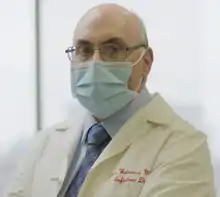Drew Weissman
Drew Weissman is a physician-scientist best known for his work with RNA biology that laid the groundwork for the mRNA vaccines for COVID-19 developed by BioNTech/Pfizer and Moderna.[1] Weissman is a Professor of Medicine at the Perelman School of Medicine at the University of Pennsylvania.
Drew Weissman MD Ph.D | |
|---|---|
 | |
| Education | Brandeis University - BA, MA Boston University - MD, Ph.D |
| Organization | Perelman School of Medicine at the University of Pennsylvania |
| Known for | Inventor of modified mRNA technologies used in COVID-19 vaccines |
| Title | Professor of Medicine |
Education and training
Weissman received his B.A. and M.A. from Brandeis University in 1981, where he majored in biochemistry/enzymology and worked in the lab of Gerald Fasman.[2] He performed his graduate work at Boston University in immunology/microbiology where he received his MD and Ph.D in 1987.[3] Afterwards, Weissman did a residency at Beth Israel Deaconess Medical Center, followed by a fellowship at the National Institutes of Health (NIH) under the supervision of Anthony Fauci – the current director of the National Institute of Allergy and Infectious Diseases.[4]
Career
In 1997, Weissman moved to the University of Pennsylvania to start his lab studying RNA and innate immune system biology. It was at the University of Pennsylvania, where he discovered, patented, and published, with Katalin Karikó, the modifications to RNA required to make it viable as a therapy. In 2006, he and Karikó co-founded RNARx to attempt to develop novel RNA therapies. Weissman is a member of the American Federation for Clinical Research, The Association of American Physicians, and The American Association of Immunologists.[5]
Scientific contributions
Weissman, an immunologist studying vaccines, met colleague and collaborator Katalin Karikó at a photocopier at Penn, where they sympathized about the lack of funding for RNA research. At the time, Karikó had been trying RNA therapy on cerebral diseases and strokes.[6] Weissman began collaborating with Karikó, who then switched her focus to RNA based vaccines. The main obstacle they faced was that the RNA itself was causing unwanted immune and inflammatory reactions. In 2005, they published a landmark study[7] that used synthetic nucleosides to modify the RNA to make it invisible to the body. This breakthrough laid the groundwork for the use of RNA therapeutics, and was eventually licensed by BioNTech/Pfizer and Moderna for development of their now FDA approved COVID-19 vaccines.[8] Weissman has also been collaborating with scientists in Thailand to develop and provide COVID-19 vaccines for the country and neighboring low income countries that may not have immediate access to the vaccine.[1] It has been suggested that Weissman and Karikó be awarded the Nobel Prize for their discoveries.[9] Both have been awarded the 2020 Rosenstiel Award.[10]
Patents
Weissman is the inventor on many patents, including US8278036B2[11] & US8748089B2[12] which detail the modifications required to make RNA suitable for vaccines and other therapies. These patents were licensed to Gary Dahl who founded and is CEO of CELLSCRIPT, who subsequently licensed the technology to Moderna and BioNTech to ultimately use in their COVID-19 vaccines.[13]
References
- "This Philly Scientist's Technology Helped Make the Pfizer COVID-19 Vaccine Possible".
- "The Brandeis alum whose research may lead to a COVID-19 vaccine". BrandeisNOW. Retrieved 2021-01-08.
- "Drew Weissman | Faculty | About Us | Perelman School of Medicine | Perelman School of Medicine at the University of Pennsylvania". www.med.upenn.edu. Retrieved 2021-01-08.
- Johnson, Carolyn Y. "A gamble pays off in 'spectacular success': How the leading coronavirus vaccines made it to the finish line". Washington Post. ISSN 0190-8286. Retrieved 2021-01-08.
- "Drew Weissman, MD, PhD profile | PennMedicine.org". www.pennmedicine.org. Retrieved 2021-01-08.
- "Drew Weissman, l'architecte des vaccins contre le Covid-19". LEFIGARO (in French). Retrieved 2021-01-08.
- Karikó, Katalin; Buckstein, Michael; Ni, Houping; Weissman, Drew (August 2005). "Suppression of RNA recognition by Toll-like receptors: the impact of nucleoside modification and the evolutionary origin of RNA". Immunity. 23 (2): 165–175. doi:10.1016/j.immuni.2005.06.008. ISSN 1074-7613. PMID 16111635.
- Board, Editorial. "Opinion | The record turnaround for covid-19 vaccines has years of extraordinary science to thank". Washington Post. ISSN 0190-8286. Retrieved 2021-01-08.
- "The story of mRNA: From a loose idea to a tool that may help curb Covid". STAT. 2020-11-10. Retrieved 2021-01-08.
- "Lewis S. Rosenstiel Award for Distinguished Work in Basic Medical Research". www.brandeis.edu. Retrieved 2021-01-23.
- "Espacenet – search results". worldwide.espacenet.com. Retrieved 2021-01-08.
- "Espacenet – search results". worldwide.espacenet.com. Retrieved 2021-01-08.
- Dolgin, Elie (2015-06-04). "Business: The billion-dollar biotech". Nature News. 522 (7554): 26–28. Bibcode:2015Natur.522...26D. doi:10.1038/522026a. PMID 26040878. S2CID 4450181.
